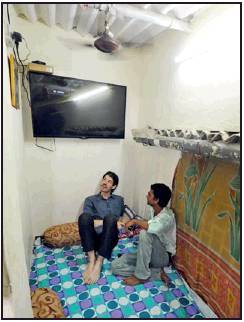- MUMBAI: While selling maps on Linking Road in 2015, Ravi Sansi struck up a conversation with a tourist from Singapore who was being harassed by street urchins. She asked him to take her to a scenic spot and he happily obliged—first whisking her off to Girgaon Chowpatty before inviting her to his jhopadpatti off Golibar Road in Khar (East). At home, his mother took an instant liking to the 28-year-old visitor and invited her to stay with the 16-member family in their one-room tenement. "She slept in the same bed as my bhabhi, learned to cook and would wash her clothes sitting with my mother in the doorway," says Sansi. "She cried when she left because she was so happy to have met me."
- Today, Sansi plans to start Mumbai's first "slum homestay" where his family will host tourists who want to "step out of their comfort zone". The guests will stay in the family's newly acquired loft that boasts a new mattress, a flat-screen TV and an air-conditioner, but use the same toilet facility as the rest of the slum. "We would be very happy if they eat with us," says Sansi, "but we can also direct them to a nearby restaurant."
- The idea was suggested by 32-year-old David Bijl, who is from the Netherlands and works for the same non-profit that hired Sansi after Google Maps made his job of selling paper maps redundant. Sansi and his family warmed to the idea because they were in need of funds—spending a night at Sansi's home will cost a couple Rs 2,000 and the entire amount will go to the host family.
- The lane leading to Sansi's home is narrow with open drains and most of Sansi's family can't speak English, but Bijl is certain anyone who opts for this experience will shrug off these discomforts. He has spent the night in the loft, so he can vouch for the fact that a seasoned traveller won't fall ill. Sansi's family is also willing to venture out of their comfort zone by hosting unmarried couples—as long as they are foreigners—and overlooking faux pas like a tourist not taking their shoes off in the house. As of now, they have not acquired permissions from the government, but plan to maintain a guest register and fill an online form each time they welcome a foreign guest in accordance with the law.



